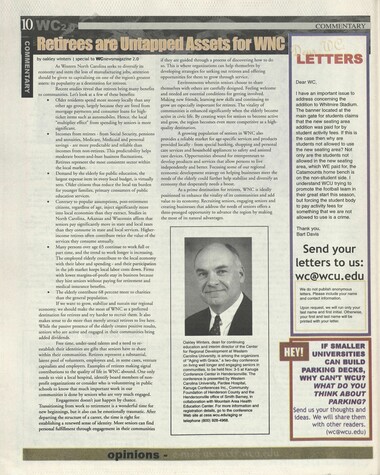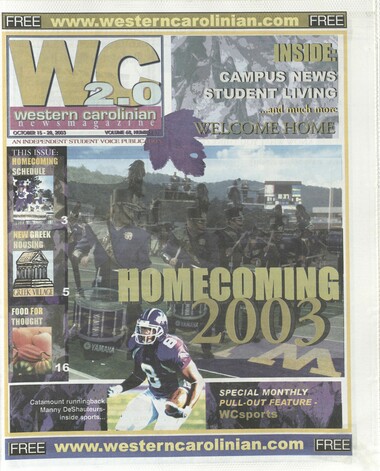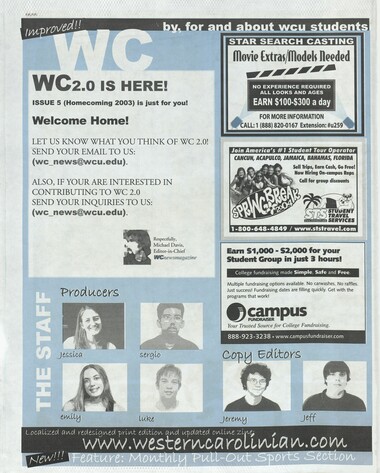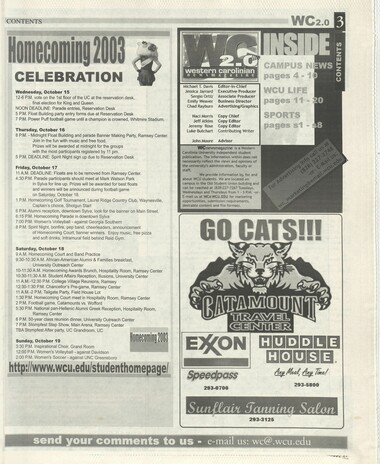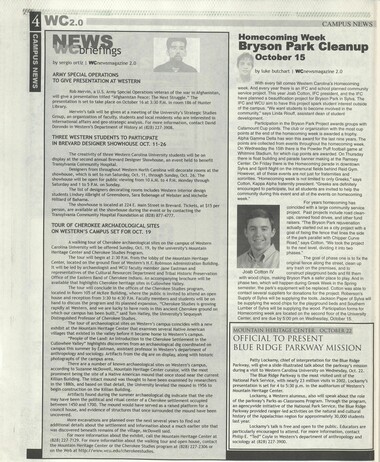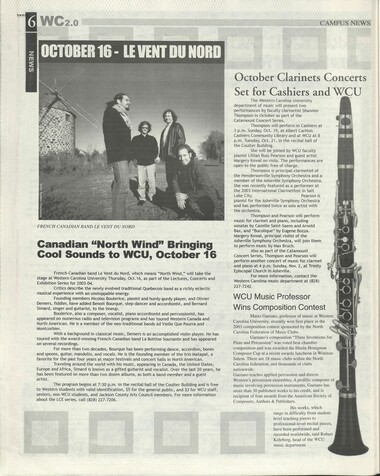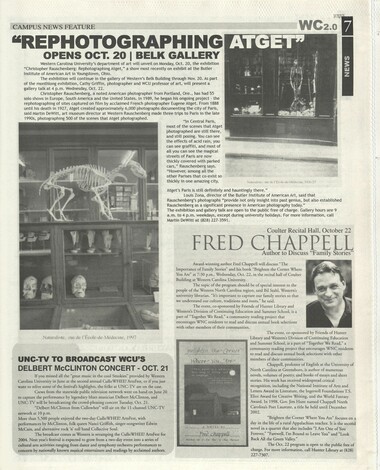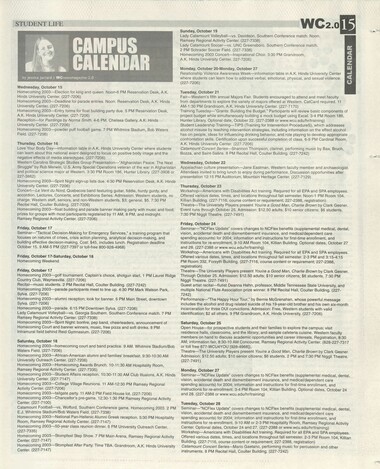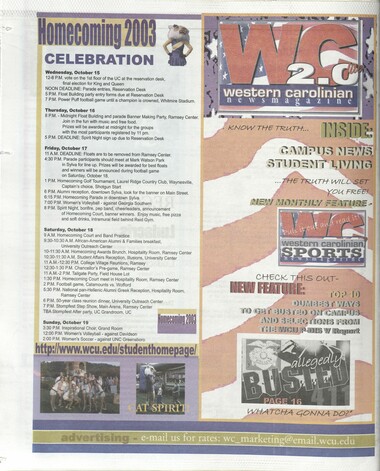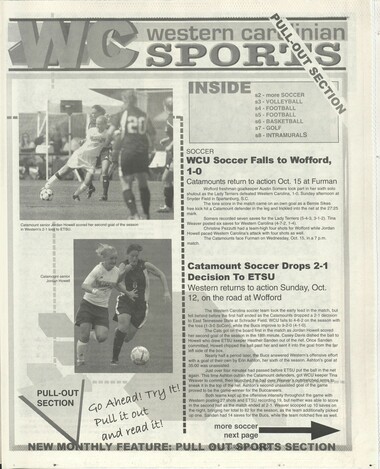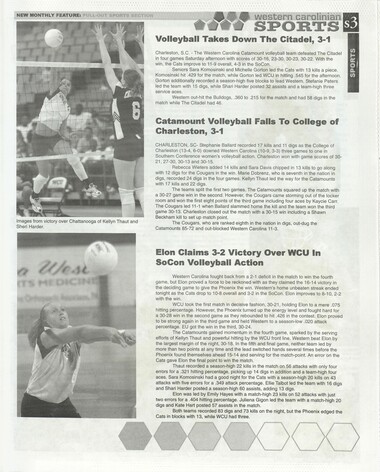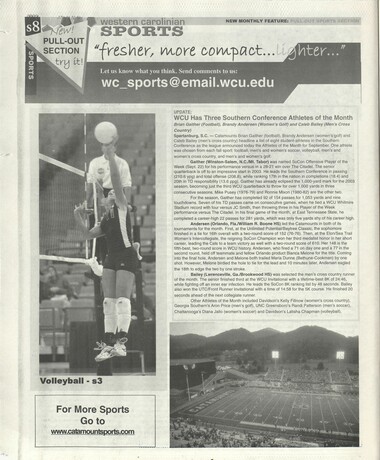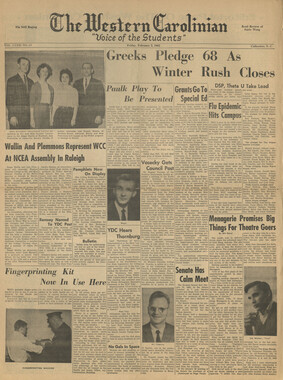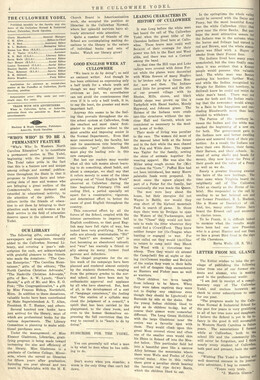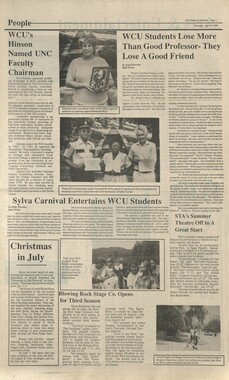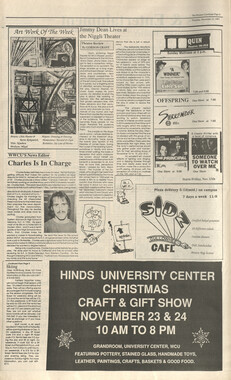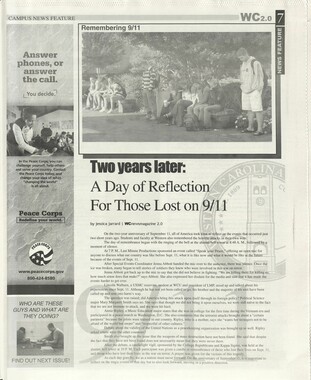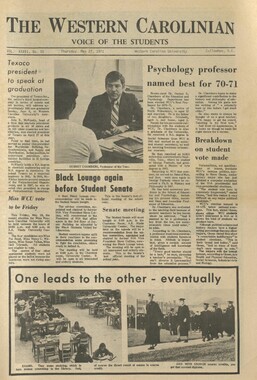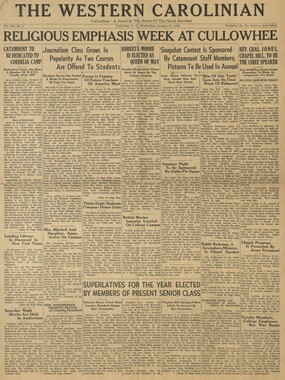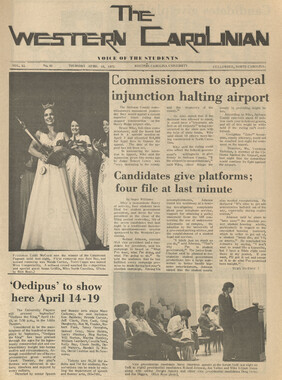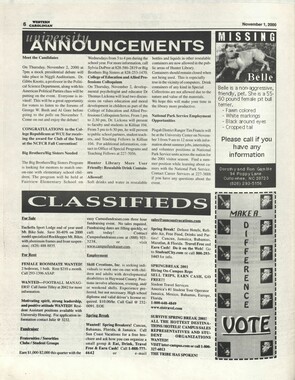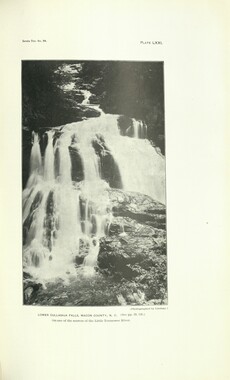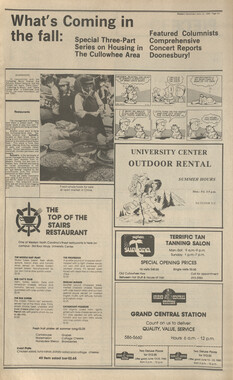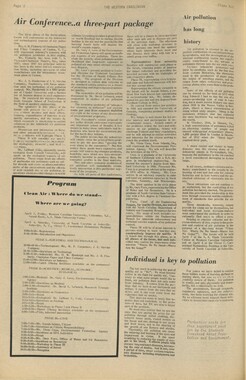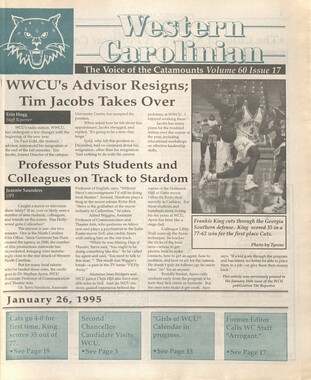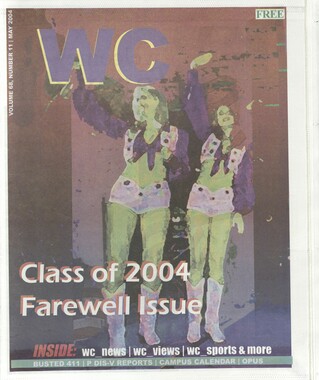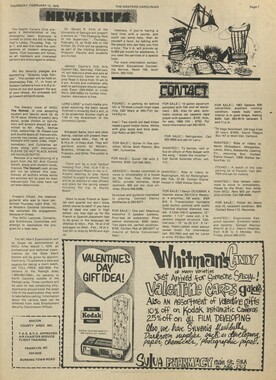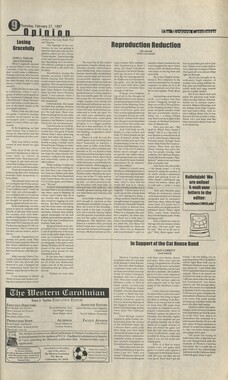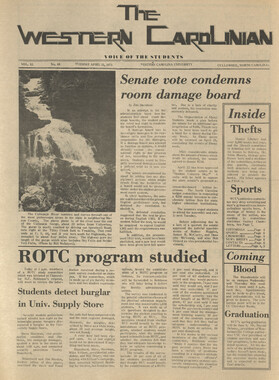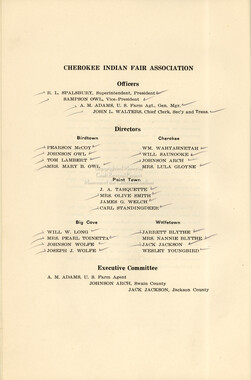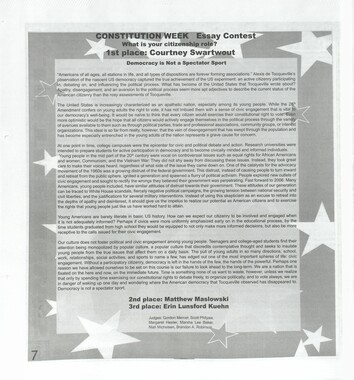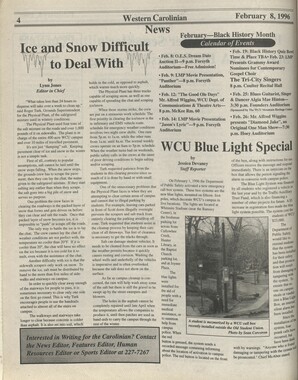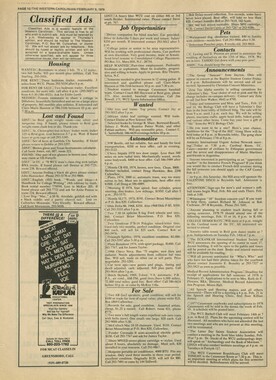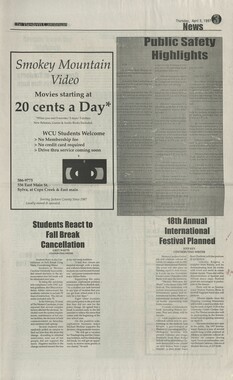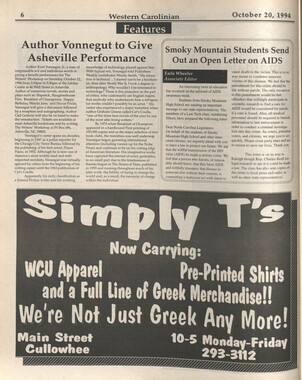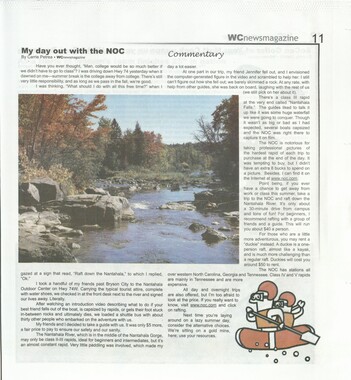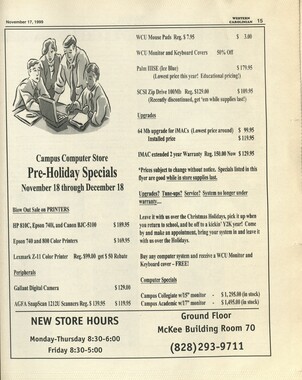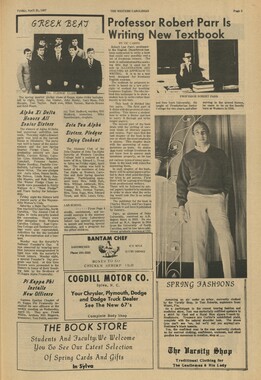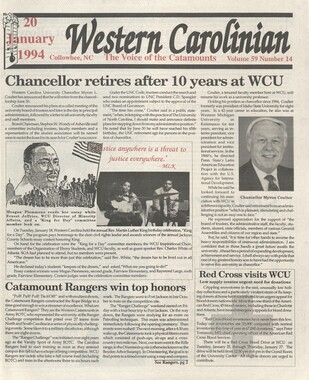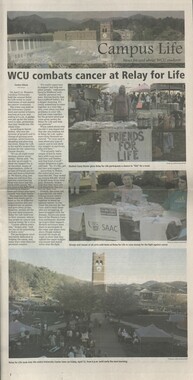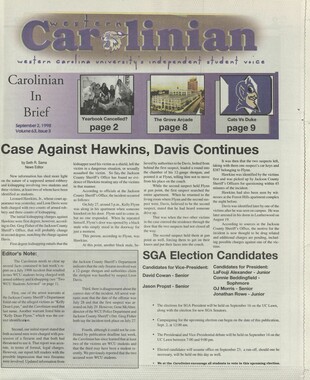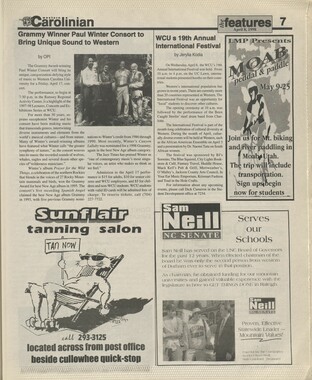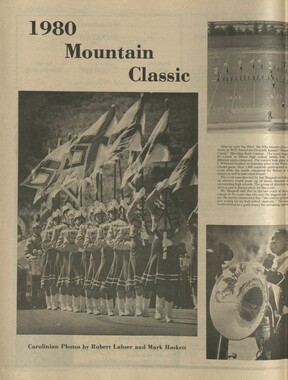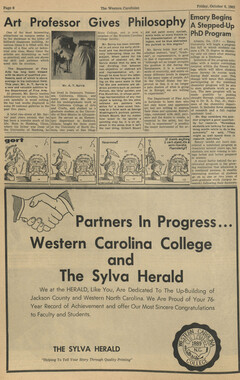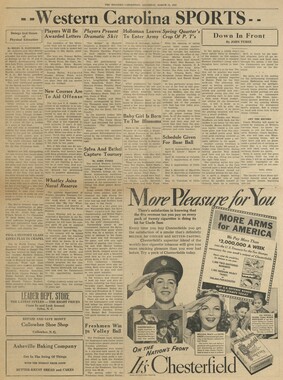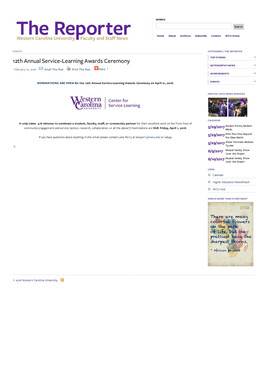Western Carolina University (21)
View all
- Canton Champion Fibre Company (2308)
- Cherokee Traditions (291)
- Civil War in Southern Appalachia (165)
- Craft Revival (1942)
- George Masa Collection (137)
- Great Smoky Mountains - A Park for America (3080)
- Highlights from Western Carolina University (422)
- Horace Kephart (973)
- Journeys Through Jackson (159)
- LGBTQIA+ Archive of Jackson County (89)
- Oral Histories of Western North Carolina (317)
- Picturing Appalachia (6617)
- Stories of Mountain Folk (413)
- Travel Western North Carolina (153)
- Western Carolina University Fine Art Museum Vitreograph Collection (129)
- Western Carolina University Herbarium (92)
- Western Carolina University: Making Memories (738)
- Western Carolina University Publications (2491)
- Western Carolina University Restricted Electronic Theses and Dissertations (146)
- Western North Carolina Regional Maps (71)
- World War II in Southern Appalachia (131)
University of North Carolina Asheville (6)
View all
- Allanstand Cottage Industries (62)
- Appalachian National Park Association (53)
- Bennett, Kelly, 1890-1974 (1463)
- Berry, Walter (76)
- Brasstown Carvers (40)
- Carver, George Washington, 1864?-1943 (26)
- Cathey, Joseph, 1803-1874 (1)
- Champion Fibre Company (233)
- Champion Paper and Fibre Company (297)
- Cherokee Indian Fair Association (16)
- Cherokee Language Program (22)
- Crowe, Amanda (40)
- Edmonston, Thomas Benton, 1842-1907 (7)
- Ensley, A. L. (Abraham Lincoln), 1865-1948 (275)
- Fromer, Irving Rhodes, 1913-1994 (70)
- George Butz (BFS 1907) (46)
- Goodrich, Frances Louisa (120)
- Grant, George Alexander, 1891-1964 (96)
- Heard, Marian Gladys (60)
- Kephart, Calvin, 1883-1969 (15)
- Kephart, Horace, 1862-1931 (313)
- Kephart, Laura, 1862-1954 (67)
- Laney, Gideon Thomas, 1889-1976 (439)
- Masa, George, 1881-1933 (61)
- McElhinney, William Julian, 1896-1953 (44)
- Niggli, Josephina, 1910-1983 (10)
- North Carolina Park Commission (105)
- Osborne, Kezia Stradley (9)
- Owens, Samuel Robert, 1918-1995 (11)
- Penland Weavers and Potters (36)
- Roberts, Vivienne (15)
- Roth, Albert, 1890-1974 (142)
- Schenck, Carl Alwin, 1868-1955 (1)
- Sherrill's Photography Studio (2565)
- Southern Highland Handicraft Guild (127)
- Southern Highlanders, Inc. (71)
- Stalcup, Jesse Bryson (46)
- Stearns, I. K. (213)
- Thompson, James Edward, 1880-1976 (226)
- United States. Indian Arts and Crafts Board (130)
- USFS (683)
- Vance, Zebulon Baird, 1830-1894 (1)
- Weaver, Zebulon, 1872-1948 (58)
- Western Carolina College (230)
- Western Carolina Teachers College (282)
- Western Carolina University (2008)
- Western Carolina University. Mountain Heritage Center (18)
- Whitman, Walt, 1819-1892 (10)
- Wilburn, Hiram Coleman, 1880-1967 (73)
- Williams, Isadora (3)
- Cain, Doreyl Ammons (0)
- Crittenden, Lorraine (0)
- Rhodes, Judy (0)
- Smith, Edward Clark (0)
- Appalachian Region, Southern (3032)
- Asheville (N.C.) (1945)
- Avery County (N.C.) (26)
- Blount County (Tenn.) (195)
- Buncombe County (N.C.) (1680)
- Cherokee County (N.C.) (283)
- Clay County (N.C.) (556)
- Graham County (N.C.) (238)
- Great Smoky Mountains National Park (N.C. and Tenn.) (525)
- Haywood County (N.C.) (3573)
- Henderson County (N.C.) (70)
- Jackson County (N.C.) (4924)
- Knox County (Tenn.) (35)
- Knoxville (Tenn.) (13)
- Lake Santeetlah (N.C.) (10)
- Macon County (N.C.) (421)
- Madison County (N.C.) (216)
- McDowell County (N.C.) (39)
- Mitchell County (N.C.) (135)
- Polk County (N.C.) (35)
- Qualla Boundary (982)
- Rutherford County (N.C.) (78)
- Swain County (N.C.) (2185)
- Transylvania County (N.C.) (270)
- Watauga County (N.C.) (12)
- Waynesville (N.C.) (86)
- Yancey County (N.C.) (72)
- Aerial Photographs (3)
- Aerial Views (60)
- Albums (books) (4)
- Articles (1)
- Artifacts (object Genre) (228)
- Bibliographies (1)
- Biography (general Genre) (2)
- Cards (information Artifacts) (38)
- Clippings (information Artifacts) (192)
- Copybooks (instructional Materials) (3)
- Crafts (art Genres) (622)
- Depictions (visual Works) (21)
- Design Drawings (1)
- Digital Moving Image Formats (2)
- Drawings (visual Works) (185)
- Envelopes (101)
- Exhibitions (events) (1)
- Facsimiles (reproductions) (1)
- Fiction (general Genre) (4)
- Financial Records (12)
- Fliers (printed Matter) (67)
- Glass Plate Negatives (381)
- Guidebooks (2)
- Internegatives (10)
- Interviews (822)
- Land Surveys (102)
- Letters (correspondence) (1045)
- Manuscripts (documents) (618)
- Maps (documents) (177)
- Memorandums (25)
- Minutes (administrative Records) (59)
- Negatives (photographs) (6090)
- Newsletters (1290)
- Newspapers (2)
- Notebooks (8)
- Occupation Currency (1)
- Paintings (visual Works) (1)
- Pen And Ink Drawings (1)
- Periodicals (194)
- Personal Narratives (10)
- Photographs (12977)
- Plans (maps) (1)
- Poetry (6)
- Portraits (4568)
- Postcards (329)
- Programs (documents) (181)
- Publications (documents) (2444)
- Questionnaires (65)
- Relief Prints (26)
- Sayings (literary Genre) (1)
- Scrapbooks (282)
- Sheet Music (2)
- Slides (photographs) (402)
- Songs (musical Compositions) (2)
- Sound Recordings (801)
- Specimens (92)
- Speeches (documents) (18)
- Tintypes (photographs) (8)
- Transcripts (328)
- Text Messages (0)
- A.L. Ensley Collection (275)
- Appalachian Industrial School Records (7)
- Appalachian National Park Association Records (336)
- Axley-Meroney Collection (2)
- Bayard Wootten Photograph Collection (20)
- Bethel Rural Community Organization Collection (7)
- Blumer Collection (5)
- C.W. Slagle Collection (20)
- Canton Area Historical Museum (2110)
- Carlos C. Campbell Collection (462)
- Cataloochee History Project (64)
- Cherokee Studies Collection (4)
- Daisy Dame Photograph Album (5)
- Daniel Boone VI Collection (1)
- Doris Ulmann Photograph Collection (112)
- Elizabeth H. Lasley Collection (1)
- Elizabeth Woolworth Szold Fleharty Collection (4)
- Frank Fry Collection (95)
- George Masa Collection (173)
- Gideon Laney Collection (452)
- Hazel Scarborough Collection (2)
- Hiram C. Wilburn Papers (28)
- Historic Photographs Collection (236)
- Horace Kephart Collection (861)
- Humbard Collection (33)
- Hunter and Weaver Families Collection (1)
- I. D. Blumenthal Collection (4)
- Isadora Williams Collection (4)
- Jesse Bryson Stalcup Collection (47)
- Jim Thompson Collection (224)
- John B. Battle Collection (7)
- John C. Campbell Folk School Records (80)
- John Parris Collection (6)
- Judaculla Rock project (2)
- Kelly Bennett Collection (1482)
- Love Family Papers (11)
- Major Wiley Parris Civil War Letters (3)
- Map Collection (12)
- McFee-Misemer Civil War Letters (34)
- Mountain Heritage Center Collection (4)
- Norburn - Robertson - Thomson Families Collection (44)
- Pauline Hood Collection (7)
- Pre-Guild Collection (2)
- Qualla Arts and Crafts Mutual Collection (12)
- R.A. Romanes Collection (681)
- Rosser H. Taylor Collection (1)
- Samuel Robert Owens Collection (94)
- Sara Madison Collection (144)
- Sherrill Studio Photo Collection (2558)
- Smoky Mountains Hiking Club Collection (616)
- Stories of Mountain Folk - Radio Programs (374)
- The Reporter, Western Carolina University (510)
- Venoy and Elizabeth Reed Collection (16)
- WCU Gender and Sexuality Oral History Project (36)
- WCU Mountain Heritage Center Oral Histories (25)
- WCU Oral History Collection - Mountain People, Mountain Lives (71)
- WCU Students Newspapers Collection (1923)
- Western North Carolina Tomorrow Black Oral History Project (69)
- William Williams Stringfield Collection (2)
- Zebulon Weaver Collection (109)
- African Americans (390)
- Appalachian Trail (35)
- Artisans (521)
- Cherokee art (84)
- Cherokee artists -- North Carolina (10)
- Cherokee language (21)
- Cherokee pottery (101)
- Cherokee women (208)
- Church buildings (190)
- Civilian Conservation Corps (U.S.) (111)
- College student newspapers and periodicals (2012)
- Dams (108)
- Dance (1023)
- Education (222)
- Floods (63)
- Folk music (1015)
- Forced removal, 1813-1903 (2)
- Forest conservation (220)
- Forests and forestry (1198)
- Gender nonconformity (4)
- Great Smoky Mountains National Park (N.C. and Tenn.) (181)
- Hunting (47)
- Landscape photography (25)
- Logging (122)
- Maps (83)
- Mines and mineral resources (9)
- North Carolina -- Maps (18)
- Paper industry (38)
- Postcards (255)
- Pottery (135)
- Railroad trains (72)
- Rural electrification -- North Carolina, Western (3)
- School integration -- Southern States (2)
- Segregation -- North Carolina, Western (5)
- Slavery (5)
- Sports (452)
- Storytelling (243)
- Waterfalls -- Great Smoky Mountains (N.C. and Tenn.) (66)
- Weaving -- Appalachian Region, Southern (280)
- Wood-carving -- Appalachian Region, Southern (328)
- World War, 1939-1945 (173)
Western Carolinian Volume 68 Number 05
Item
Item’s are ‘child’ level descriptions to ‘parent’ objects, (e.g. one page of a whole book).
-
-
0 by Oakley winters I special to WCnewsmagazine 2.0 As Western North Carolina seeks to diversify Its economy and stem the loss of manufacturing jobs, attention should be given to capitalizing on one of the region's greatest assets: its popularity as a destination for retirees. Recent studies reveal that retirees bring many benefits to communities. Let's look at a few of these benefits: Older residents spend more money locally than any other age group, largely because they are freed from mortgage payments and consumer loans for high- ticket items such as automobiles. Hence, the local "multiplier effect" from spending by seniors is more significant. Incomes from retirees - from Social Security, pensions and annuities, Medicare, Medicaid and personal savings - are more predictable and reliable than incomes from non-retirees. This predictability helps moderate boom-and-bust business fluctuations. Retirees represent the most consistent sector within the local market. Demand by the elderly for public education, the largest expense item in every local budget, is virtually zero. Older citizens thus reduce the local tax burden for younger families, primary consumers of public education services. Contrary to popular assumptions, post-retirement citizens, regardless of age, inject significantly more into local economies than they extract. Studies in North Carolina, Arkansas and Wisconsin affirm that seniors pay significantly more in state and local taxes than they consume in state and local services. Higher- income retirees often contribute twice the value of the services they consume annually. Many persons over age 65 continue to work full or part time, and the trend to work longer is increasing. The employed elderly contribute to the local economy with their labor and spending - and their participation in the job market keeps local labor costs down. Firms with lower margins-of-profit stay in business because they hire seniors without paying for retirement and medical insurance benefits. The elderly contribute 68 percent more to charities than the general population. If we want to grow, stabilize and sustain our regional economy, we should make the most ofWNC as a preferred destination for retirees and try harder to recruit them. It also makes sense to do more than merely attract retirees to live here. While the passive presence of the elderly creates positive results, seniors who are active and engaged in their communities bring added dividends. Free time, under-used talents and a need to re- establish their identities are gifts that seniors have to share within their communities. Retirees represent a substantial, latent pool of volunteers, employees and, in some cases, venture capitalists and employers. Examples of retirees making signal contributions to the quality of life in WNC abound. One only needs to visit a local hospital, identi$r board members of non- profit organizations or consider who is volunteering in public schools to know that much important work in our communities is done by seniors who are very much engaged. Engagement doesn't just happen by chance. Transitioning from work to retirement is a wonderful time for new beginnings, but it also can be emotionally traumatic. After departing the structure of a career, the time is right for establishing a renewed sense of identity. More seniors can find personal fulfillment through engagement in their communities if they are guided through a process of discovering how to do so. This is where organizations can help themselves by developing strategies for seeking out retirees and offering opportunities for them to grow through service. Environments wherein seniors choose to share themselves with others are carefully designed. Feeling welcome and needed are essential conditions for getting involved. Making new friends, learning new skills and continuing to grow are especially important for retirees. The vitality of communities is enhanced significantly when the elderly become active in civic life. By creating ways for seniors to become active and grow, the region becomes even more competitive as a high- quality destination. A growing population of seniors in WNC also provides a reliable market for age-specific services and products provided locally - from special banking, shopping and personal care services and household appliances to safety and assisted care devices. Opportunities abound for entrepreneurs to develop products and services that allow persons to live independently and better. Focusing some of our regional economic development strategy on helping businesses meet the needs of the elderly could further help stabilize and diversify an economy that desperately needs a boost. As a prime destination for retirees, WNC is ideally positioned to enhance the vitality of its communities and add value to its economy. Recruiting seniors, engaging seniors and creating businesses that address the needs of seniors offers a three-pronged opportunity to advance the region by making the most of its natural advantages. Oakley Winters, dean for continuing education and interim director of the Center for Regional Development at Western Carolina University, is among the organizers of "Aging with Grace," a two-day conference on living well longer and engaging seniors in communities, to be held Nov. 3-5 at Kanuga Conference Center in Hendersonville. The conference is presented by Western Carolina University, Pardee Hospital, Kanuga Conferences Inc., Community Foundation of Henderson County and the Hendersonville office of Smith Barney, in collaboration with Mountain Area Health Education Center. For more information and registration details, go to the conference Web site at cess.wcu.edu/aging or telephone (800) 928-4968. COMMENTARY LETTERS Dear WC, I have an important issue to address concerning the addition to Whitmire Stadium. The banner located at the main gate for students claims that the new seating area addition was paid for by student activity fees. If this is the case then why are students not allowed to use the new seating area? Not only are the students not allowed in the new seating area, which WE paid for, the Catamounts home bench is on the non-student side. I understand WCU trying to promote the football team in their great start this season, but forcing the student body to pay activity fees for something that we are not allowed to use is a crime. Thank you, Bart Davis Send your letters to us: wc@wcu.edu We do not publish anonymous letters. Please include your name and contact information. Upon request, we will run only your last name and first initial. Otherwise, your first and last name will be printed with your letter. IF SMALLER HEY! UNIVERSITIES CAN BUILD PARKING DECKS, WHY CAN'T WCU? WHAT DO YOU THINK ABOUT PARKING? Send us your thoughts and ideas. We will share them with other readers. (wc@wcu.edu) o 1
Object
Object’s are ‘parent’ level descriptions to ‘children’ items, (e.g. a book with pages).
-
The Western Carolinian is Western Carolina University's student-run newspaper. The paper was published as the Cullowhee Yodel from 1924 to 1931 before changing its name to The Western Carolinian in 1933.
-
